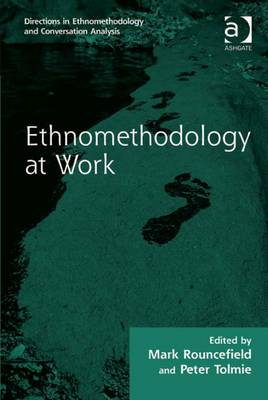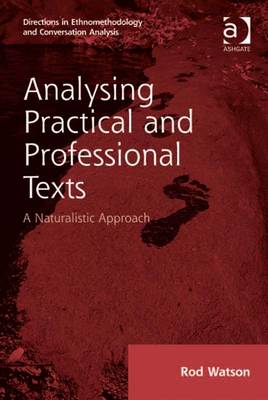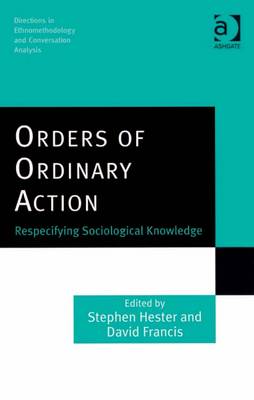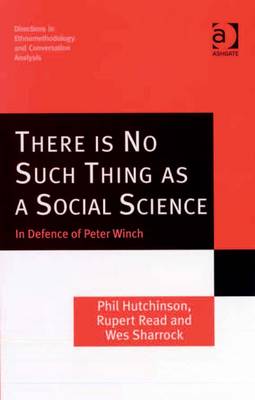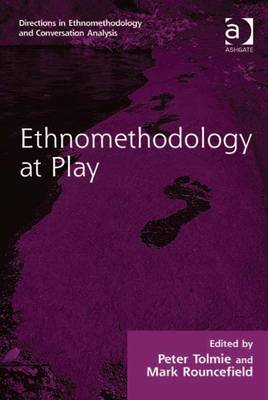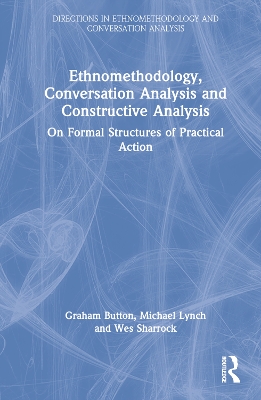Directions in Ethnomethodology and Conversation Analysis
7 total works
Socialization: Parent-Child Interaction in Everyday Life
by Dr. Sara Keel
Adopting a conversation analytic approach informed by ethnomethodology, this book examines the process of socialization as it takes place within everyday parent-child interactions. Based on a large audio-visual corpus featuring footage of eight families filmed extensively in their homes, the author focuses on the initiation of interactive assessment sequences on the part of young children with their parents and the manner in which, by means of embodied resources, such as talk, gaze, and gesture, they acquire communicative skills and a sense of themselves as effective social actors.
With attention to the responses of parents and their understanding of their children’s participation in exchanges, and the implications of these for children’s communication this book sheds new light on the ways in which parents and children achieve shared understanding, how they deal with matters of `alignment’ or `disalignment’ and issues related to their respective membership categories.
As a rigorous and detailed study of children’s early socialization as well as the structural and embodied organization of communicative sequences, Socialization: Parent-Child Interaction in Everyday Life will appeal to scholars of sociology and child development with interests in ethnomethodology and conversation analysis, early years’ socialization and the sociology of family life.
Ethnomethodology at Work
Bringing together one of the most important bodies of research into people's working practices, this volume outlines the specific character of the ethnomethodological approach to work, providing an introduction to the key conceptual resources ethnomethodology has drawn upon in its studies, and a set of substantive chapters that examine how people work from a foundational perspective.
With contributions from leading experts in the field, including Graham Button, John Hughes and Wes Sharrock, Ethnomethodology at Work explores the contribution that ethnomethodological studies continue to make to our understanding of the ways in which people actually accomplish work from day to day. As such, it will appeal not only to those working in the areas of ethnomethodology and conversation analysis, but also to those with interests in the sociology of work and organisations.
Analysing Practical and Professional Texts focuses on texts as constituents of human usage, showing how written documents and other 'texts' are integral to social organization. It reveals social organization itself to be not only textually-mediated in nature, but also textually-constituted, showing how texts – professional, technical or otherwise – as well as various social-scientific methodologies employ the resources of ordinary language.
Theoretically sophisticated and illustrated with empirical examples, this book will be of interest not only to those with interests in ethnomethodology and conversation analysis, but also to social scientists and anthropologists concerned with text analysis, textual sense and the 'linguistic turn' in the methods of their own disciplines.
Orders of Ordinary Action
Presenting original research studies by leading scholars in the field, Orders of Ordinary Action considers how ethnomethodology provides for an 'alternate' sociology by respecifying sociological phenomena as locally accomplished members' activities. Following an introduction by the editors and a seminal statement of ethnomethodology's analytic stance by its founder, Harold Garfinkel, the book then comprises two parts. The first introduces studies of practical action and organization, whilst the second provides studies of practical reasoning and situated logic in various settings. By organizing the book in this way, the collection demonstrates the relevance of ethnomethodological investigations to established topics and issues and indicates the contribution that ethnomethodology can make to the understanding of human action in any and all social contexts. Both individually and collectively, these contributions illustrate how taking an ethnomethodological approach opens up for investigation phenomena that are taken for granted in conventional sociological theorizing.
There is No Such Thing as a Social Science
by Dr. Phil Hutchinson, Rupert Read, and Wes Sharrock
The death of Peter Winch in 1997 sparked a revived interest in his work with this book arguing his work suffered misrepresentation in both recent literature and in contemporary critiques of his writing. Debates in philosophy and sociology about foundational questions of social ontology and methodology often claim to have adequately incorporated and moved beyond Winch's concerns. Re-establishing a Winchian voice, the authors examine how such contentions involve a failure to understand central themes in Winch's writings and that the issues which occupied him in his Idea of a Social Science and its Relation to Philosophy and later papers remain central to social studies.
The volume offers a careful reading of the text in alliance with Wittgensteinian insights and alongside a focus on the nature and results of social thought and inquiry. It draws parallels with other movements in the social studies, notably ethnomethodology, to demonstrate how Winch's central claim is both more significant and more difficult to transcend than sociologists and philosophers have hitherto imagined.
Ethnomethodology at Play
This book outlines the specific character of the ethnomethodological approach to 'play'; that is, to everyday sport and leisure activities that people generally engage in for enjoyment, at home or as a 'hobby'.
With chapters on cooking, running, playing music, dancing, rock climbing, sailing, fly fishing and going out for the day as a family, Ethnomethodology at Play provides an introduction to the key conceptual resources drawn upon by ethnomethodology in its studies of these activities, whilst exploring the manner in which people 'work' at their everyday leisure.
Demonstrating the breadth of ethnomethodological analysis and showing how no topic is beyond ethnomethodology's fundamental respecification, Ethnomethodology at Play sets out for the serious reader and researcher the precise contribution of ethnomethodology to sociological studies of sport and leisure and ordinary domestic pastimes. As such this groundbreaking volume constitutes a significant contribution to both ethnomethodology and sociology in general, as well as to the sociology of sport and leisure, the sociology of domestic and daily life and cultural studies.
Ethnomethodology, Conversation Analysis and Constructive Analysis
by Graham Button, Michael Lynch, and Wes Sharrock
This book revisits the arguments by which Harvey Sacks and Harold Garfinkel opposed the widespread attempt in the social sciences to construct disciplinary theories and methods in place of common-sense knowledge of human action, and proposed instead an alternative that would investigate the organised methods of natural language use and common-sense reasoning that constitute social orders – arguments that led to the establishment and proliferation of ethnomethodology and conversation analysis.
As the very "constructive analysis" that they opposed has begun to be incorporated into influential lines of research in ethnomethodology and conversation analysis, the authors return to the founding insights of the field and reiterate the importance of Garfinkel and Sacks’ original and controversial proposals for an "alternate" sociology of practical action and practical reasoning. Showing how constructive analysis has become entrenched in ethnomethodology and conversation analysis and arguing for a need to "re-boot" these approaches, this volume constitutes a call for a renewal of the radical alternative proposed by Garfinkel and Sacks.

